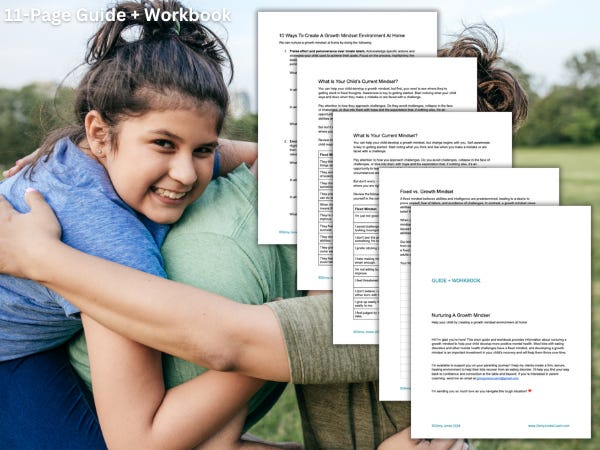Our kids crave praise - here's how to give it
Nurturing a growth mindset to support your child's mental health
Hello! I hope you and your family are doing well!
The debate about whether to praise our kids has been raging for the past 50+ years. In that time we’ve swung from the belief that praising kids leads to entitled, lazy adults to we must praise children always, regardless of their effort or participation.
Today most of us recognize that excessive, empty praise isn’t helpful and may even be harmful. On the other hand, we know our kids crave praise and acknowledgement and we don’t want to be stingy with it.
As with most things, finding the balance between excessive, empty praise and zero praise is an exercise and a practice. There’s no such thing as perfect.
Our kids crave praise because it makes them feel loved and accepted. However, the type of praise we offer matters. Research conducted by Carol Dweck and colleagues has helped us understand the intricacies of praise and how to use it in positive, motivating ways. She identifies two mindsets: fixed and growth.
Children who have a fixed mindset believe their abilities are unchangeable traits. These kids feel as if every challenge they face is a test of whether they are talented, smart, and capable. If they don’t succeed, they tend to give up on the challenge because they see their abilities as unchangeable.
These kids are more likely to suffer from conditions like stress, anxiety, depression, and eating disorders. At home, school, in therapy, and elsewhere, they’re more likely to become defensive or dig their feet in and refuse to try new things. We may describe these kids as depressed and disengaged or obsessive and perfectionistic.
Children who have a growth mindset believe their abilities can improve with effort. These kids view challenges as an opportunity to learn and grow. The truth is not every child can grow up to be an NBA player or pop star, but these children are motivated to pursue their personal best even while recognizing they are unlikely to be the best in the world.
These kids are more likely to experience stress, anxiety, and sadness as temporary states rather than fixed traits and move on from them gracefully. At home, school, and elsewhere, they tend to show persistence and optimism when faced with setbacks. We may describe these kids as motivated but balanced.
Dweck’s research found that in educational settings, shifting kids’ mindsets from fixed to growth results in greater effort, achievement, and ability to respond to stress without being crushed by it.
Of course there are many factors that contribute to a fixed vs. growth mindset. Much of our children’s development hinges on genetic traits. While parents can influence environmental factors, we can’t change our child’s inborn temperament which may make them naturally more self-critical or open-minded.
However, our behavior and the environment we create does affect the degree to which our children establish a fixed vs. growth mindset, and part of it comes down to praise.
We foster a growth mindset by praising our kids' effort instead of outcomes such as grades, awards, and achievements. We want to avoid praising traits like intelligence, beauty, thinness, or fitness or treating such things as if they are permanent, unchangeable, required for success, or something to be won or lost.
During treatment and recovery we want to build an environment of growth and expansion rather than fixed, binary thinking. Our behavior can unlock change.
As possible we want to praise our kids for effort, tenacity, and ability to work through problems and anxiety rather than praising their looks, accomplishments, and outcomes.
That said, praising eating behaviors is tricky due to our complicated culture around food. If you currently feel a lot of stress and anxiety around how your child eats, you might want to avoid praising eating behavior for now because the more stress you feel, the more likely you are to accidentally reinforce a fixed mindset.
Understandably, our own anxieties and history with food can influence how we feed our kids. It’s not our fault that food issues are so complicated, but it’s helpful to be aware of our own beliefs and attitudes.
The growth mindset is both useful and extremely tricky around food and appearance, so feel free to reach out for support if you’d like to explore this further with me.
Ginny Jones Parent Coach / More-Love.org
Coaching Notes
Here are some stories from the last few weeks of my coaching sessions with parents who have kids with anxiety, eating, and body image issues:
My clients’ child went to college and lost significant weight in the first few weeks. We talked about how they can support her and are evaluating how to proceed given the challenges of monitoring and intervening when your child is over 18.
I developed a script to help my clients respond to their child’s anxiety-driven demands for details about weight, ingredients, and other details that come up frequently in eating disorder treatment.
I wrote about why pressuring kids to eat can backfire and what to do instead. If you’d like to read it, you can do so here.
Nurturing A Growth Mindset At Home
We can help our kids thrive by creating a home environment of the Growth Mindset. In this 12-page guide and workbook you’ll learn to identify your own mindset, your child’s mindset, and the 10 steps you can use to create a growth mindset at home.
Paid Subscribers: Click the button below to get your printable and start parenting with more confidence today.







